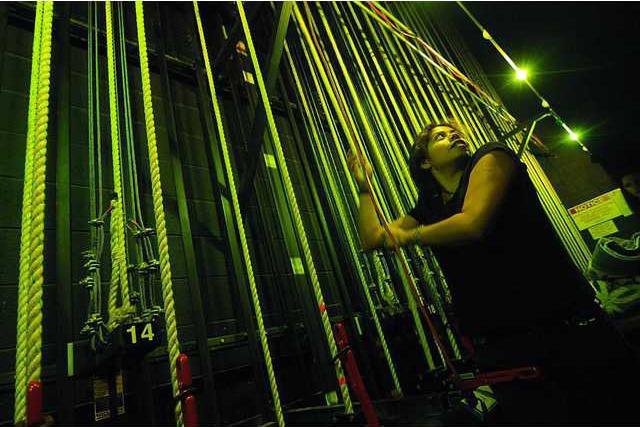A group of local artists and arts organization leaders described themselves Thursday as "artist missionaries."
Their doctrine? Art has value. But converting some legislators, school leaders and other movers and shakers across the state to that mindset sometimes seems an impossibility.
The Georgia Council for the Arts was almost eliminated entirely during last year's budget process. Now it has a little more skip in its step after it moved under the umbrella of the state Department of Economic Development, giving it access to more resources and the chance to do some long-range planning.
It's currently rethinking its mission and holding forums across the state to hear what the local arts communities want from the organization. One such meeting was held Thursday morning at The Arts Council in Gainesville.
"You can't have civilization without culture, and why do we keep having that conversation?" Jeffrey Watkins of the Shakespeare Tavern in Atlanta asked. Those in the room quickly agreed that the state council should be a voice of enlightenment, sharing the importance of the arts as an economic force and educational tool.
Maybe with enough converts, the council would have an operating budget greater than $1 million, which puts the state at a ranking of 47th in per capita spending for the arts. Half of that money comes from the state and half from the National Endowment for the Arts.
Despite the small pot of money, those in attendance had a list of dreams for the council: professional development workshops for artists to learn how to market themselves, more funds for small arts organizations, a focus on the arts as a tourism draw and ways to share art with people who have little access to it, mostly due to economic reasons.
But an overarching theme was that it's all just dust in the wind without funding to put the ideas into motion.
Gladys Wyant, executive director of The Arts Council in Gainesville, who also serves on the board of the state council, said her organization used to get upward of $30,000 a year. More recently that number has been $2,700. The local council also was a regranting agency taking $60,000 to $70,000 from the state council and distributing it to smaller arts organizations in a 10-county region. That grassroots program has been put on hiatus, though, along with educational and traditional folk art programs.
"Over the past four years, the Georgia Council for the Arts has been cut by 86 percent," Wyant said. "... But at least we're still there."
Jim Hammond, artistic and managing director of the Gainesville Theatre Alliance, didn't attend the meeting but told The Times he's been frustrated with the cuts as well, and also with the way the money the council did have has been spent in recent years. His organization also used to receive $35,000 a year, whereas it now receives about $5,000.
He said the council changed its grant funding formula, basing it on an organization's budget whereas it used to look at an organization's ranking as far as quality of programs and service in the community.
"Now it's based on how much money you spend, and we can't compete," Hammond said. "And none of us out here can compete with the size of budgets that are in metropolitan Atlanta."
Many at the meeting shared similar feelings, asking the council to provide grant funding for small organizations that have few resources. Another key issue discussed was reaching underserved communities, those people who have traditionally not had access to the arts.Hammond also echoed that sentiment, noting that though the arts could survive without government funding, it could not reach as many people.
"We can create art and sell it - it's just it's going to be people who have money that's going to buy it," Hammond said. "And most people agree that children in schools who aren't necessarily from middle- and upper-income families should be able to see Shakespeare, should be able to see a live play, should be able to go to a concert or to an art gallery. And to do that, that requires some additional support from the government and from corporations."
Theresa Rice, executive director of the Helen Arts & Heritage Council, said the meeting gave her some hope that the arts can find their place in the state. Karen Paty, director of the state council, said those two issues - funding for smaller organizations and reaching underserved communities - were something she heard more of at the Gainesville meeting than some others across the state.
The council has one more forum before taking all the comments back home and beginning to cull the ideas into a new mission and a few specific goals.
A final plan should be posted by July 1, with most changes taking effect in 2014.

